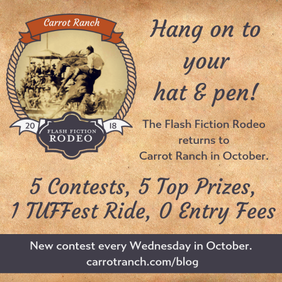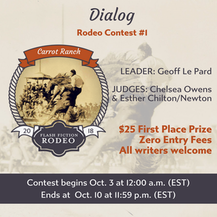| October brings the Flash Fiction Rodeo to the Ranch, with the weekly challenges suspended and the ring cleared for competitive wrangling words. Now, I’ve entered writing competitions in the past – and even won one or two – and, after initial scepticism, I’ve grown addicted to submitting my 99 words. But last year, unable to bring the two together, I could only watch from the sidelines. This year, I’m joining in. |
Finding my response to the flash fiction challenge is like looking for a certain type of book on shelves that are continually rearranged. I expect there’s something there, but don’t know how to find it, or whether it’ll be worth it when I do.
My standard initial reaction to the prompt being revealed is No, I’ve got nothing to say about that! So it’s been fun to discover that, on the contrary, I can find something. The standard of my contributions varies from week to week; but that’s okay, it’s only 99-word game.
Yet there’s part of me that thinks even the most satisfying stories I produce this way aren’t real stories. Real stories emerge from my mind in a totally different way.
The fiction I’m more accustomed to writing also arises through a meeting of inside and outside, but in a more haphazard way. I don’t actively search for stories to answer a particular question or fit a particular theme. Instead they arise organically, as a consequence of being in the world. A remark overheard, a news item, the contents of a stranger’s supermarket trolley; some small surprise or gap between what occurs and what’s expected: anything can spark a story if it connects, however obliquely, with some memory or unconscious preoccupation of my own.
While such stories still require a good deal of mind-work, they feel like something that’s been waiting to happen, waiting for some chance observation to lift the lid and let the contents spill out. I feel much more committed to the stories that emerge from within, these are the stories I’m bursting to tell.
And these are the stories I submit to competitions, or to the more prestigious magazines. But are they better than those stories generated externally in response to writing prompts? The reader’s experience isn’t the same as the writer’s: if I’m strongly attached to a story it doesn’t necessarily follow that you’ll like it too.
In fact, we might hypothesise that the externally inspired stories would be stronger, being less muddled with bits of me. Although I do have to search inside myself to find a prompted story, is it better anchored to what people might want to read?
I’d better stop introspecting on my process of introspection or I’ll have driven myself crazy before I’ve faced the first Rodeo challenge. But I’m curious about how other writers’ experience of inspiration: does yours come mostly from outside or within?
| If a conversation about inspiration doesn’t inspire you, perhaps you’ll be inspired to talk to Geoff. He wants 99-word stories told entirely in dialogue (or dialog) – but be sure to go to the post before you start composing. (A click on the image will take you there.) There’s a rather intriguing photo prompt. |























 RSS Feed
RSS Feed





















